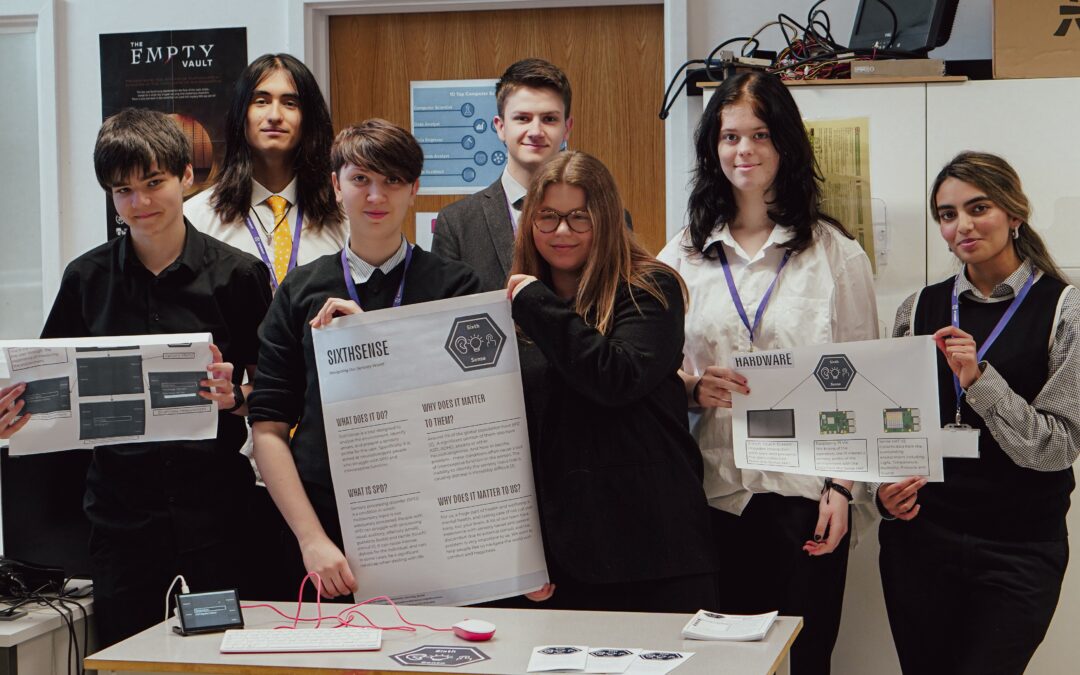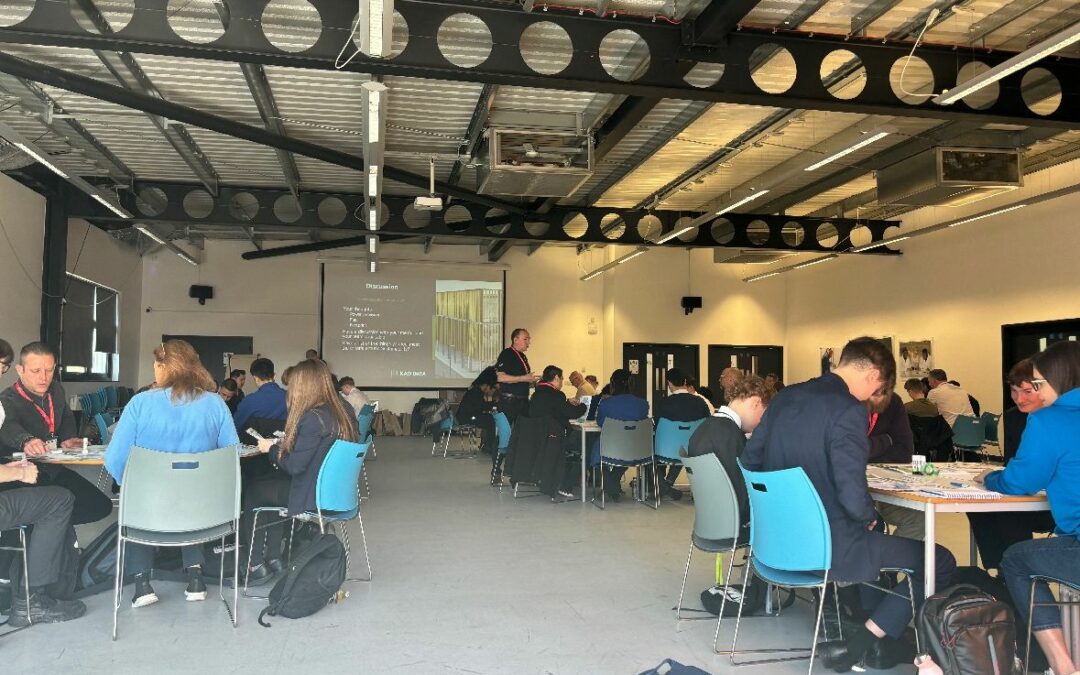The theme for this year is ‘Skills for Life’, reflecting on how apprenticeships can help individuals to develop the skills and knowledge required for a rewarding career.
This year, as usual, our UTCs embraced National Apprenticeship Week, with two of our UTCs – Swindon and Oxfordshire – holding Apprenticeship Insights drop-down days, where employers from the Forces, BMW, National Grid and Network Rail came in to talk about apprenticeship opportunities.
What is an apprenticeship?
Apprenticeships are a genuine job that allows you to get paid as you learn.
Whatever your age or experience, an apprenticeship can be a valuable investment in your future! Particularly if you’re looking for a hands-on approach to your education.
By the end of your apprenticeship, you’ll have the right skills and knowledge needed for your chosen career.
There are so many amazing apprenticeship opportunities across a variety of industries. Find out more about apprenticeships and see current vacancies at www.apprenticeships.gov.uk
Case study 1: Hassan

Former UTC Heathrow student, Hassan Elbarbary, is a Security Defence Engineer apprentice at Digital Futures Programme partner LMG
“I developed many of the skills required for this role at UTC Heathrow, thanks to the various topics I learned, both in the Digital Futures Programme and wider studies, that enhanced my understanding of the position,” he says.
Read his story here
Shall I do an apprenticeship or degree?
💡 Deciding between university or an apprenticeship?
Although you need a degree to enter certain professions, an apprenticeship can be a viable alternative to university. Apprenticeships offer:
- Hands-on experience – provide practical, hands-on experience in a specific trade or profession, which can be valuable for certain careers
- On-the-job training – offer on-the-job training, which can be a more effective way to learn certain skills compared to classroom instruction
- Clear career pathway – often lead to well-paying jobs and can offer a clear path to a successful career
- Cost-effective – tend to be less expensive than traditional university degrees
- Earn while you learn – are a way to learn and earn simultaneously, which can help to reduce student debt
- Flexibility – can be tailored to the individual’s needs and can be full-time or part-time, dependent on the person’s circumstances
The other option of course is to follow a degree apprenticeship, which gives you the opportunity to gain a paid-for degree while getting industry experience and earning a salary. Find out more here:
Case study 2: Salih

Former UTC Reading student Salih Pervaiz landed a sought after degree apprenticeship at Rolls Royce Aerospace division where he is a trainee Software Engineer.
He has this advice for those currently looking for an apprenticeship: “I did several different work experiences through school, which gave me a better idea of what companies look for, and also, what kind of thing I would be happy doing.
“My advice is to research the kind of industry you want to go into, then research the companies themselves. By Year 13 have a prepared CV – go to your parents or teachers for feedback to improve it. Apply for lots of apprenticeships and be prepared to get rejected a lot. Practice with mock interviews. If you do muck up an interview, learn from your mistake and improve for next time. Be resilient and you’ll get there.”
Read his story here
How can I apply for an apprenticeship?
Ready to level up in your career with an apprenticeship? 🚀
Here’s how to apply:
Remember apprenticeships are real jobs with lots of applicants, so prepare for some disappointments.
There are hundreds of apprenticeships to choose from and ‘Find an apprenticeship’ is a government resource to view current vacancies. The service can also be used to save and apply for vacancies and also create alerts for new vacancies in specific sectors and locations.
Many employers advertise apprenticeship vacancies on their own website, and you can apply for them directly.
Applications and CVs
Employers usually ask for applicants to submit a cover letter and CV.
For those still considering their options, it might be worth applying for an apprenticeship at the same time as applying for university which allows time to reach a decision.
It is advised that applicants apply for more than one apprenticeship opportunity to increase their chances of success.
Interviews
Interviews for apprenticeships are often similar to any other job interview but the process often differs between employers. For example, small employers might conduct one interview, whereas a large employer could request up to three.
An interview could consist of:
- a face to face interview
- a panel interview
- a phone interview
- a video interview
It is advised that the applicant does some key preparation before attending the interview. This could include:
- researching the apprenticeship and the organisation
- practicing by doing a mock interview
- checking where and when the interview is
- getting to the interview early
- dressing appropriately and staying focussed
- asking questions if they don’t understand
For more interview advice, and tips on writing a CV and cover letter, visit the National Careers Service.
The government site includes this Guide to Apprenticeship Applications and also Guide to Apprenticeship Interviews.
Case study 3: Henry

UTC Oxfordshire former student Henry Leadbeater-Hart is a Project Management Apprentice at Lockheed Martin
He is in no doubt that his UTC education equipped him with skills and attributes vital for all successful careers, saying: “UTCO provides an inspirational environment which pushes students to achieve their full potential. Alongside the dedicated and engaging teachers, it’s hard not to think, how far could I go? Without this I question whether I would be where I am today.”
What are the benefits of apprenticeships for businesses?
Apprenticeships are a win-win for employers and employees 🤝
Here are just a few benefits:
- Train and retain talent in-house, saving on recruitment costs
- Apprentices are highly motivated to learn and grow, making them valuable assets to a business
- Close skills gaps by attracting new talent to an organisation and addressing shortages within the industry – see our work with employers from the data services sector, which is booming but facing a skills shortage, with our Digital Futures Programme.
- Rejuvenate businesses with fresh perspectives and up-to-date knowledge from apprentices
- Hiring apprentices can also help promote diversity and inclusion in the workplace.
Case study 4: Ruqayyah

Former UTC Heathrow student Ruqayyah Maqsood has made a deep impact LMG, an ALET Trust partner, where she is an apprentice Fire Emergency and Security Systems Technician.
Security Engineer Lead Matt Gilbert, who is mentoring Ruqayyah, said: “Ruqayyah’s attitude to learning and the energy she brings has made having her around a mutually beneficial experience. It has had the added, unforeseen benefit of giving me the opportunity to address my own short-fallings in a positive way. I have real trouble letting things go and tend to do too much myself. Because of Ruqayyah’s attention to detail and real desire to get things right, it’s allowed me to delegate quite a lot of tasks I wouldn’t normally trust to others.
“I’ve had lots of trainees in the past, but I have to say, I’ve never had one that has added as much to my day as I have theirs.”
Read her story here
Apprenticeship Myths
Have you heard of these apprenticeship myths? Let’s debunk them! 💡
1️⃣ Apprenticeships aren’t as good as degrees 🙅♀️
Apprenticeships are valued just as highly, and you can even do a degree apprenticeship while gaining valuable industry experience
2️⃣ Apprentices don’t do “real” jobs 🤔
As an apprentice, you work on real projects from day one. You’re an employee and will be working with paying clients, treating patients and more.
3️⃣ Apprenticeships are only for school leavers 🚫
There’s no upper age limit and they can be a great opportunity for a career change later in life. An apprenticeship is a work-based route that can make you a great asset to a company with years of industry experience and skills.
4️⃣ Apprenticeships are only for people who don’t do well at school – Apprenticeships are for everyone and have different entry requirements. Find the right fit for you.
5️⃣ An apprenticeship won’t lead to a career – An apprenticeship is a work-based route that can make you a great asset to a company with years of industry experience and skills.
Case study 5: Jake

Engineering skills studied at UTC Swindon have enabled Jake Kowalski to fulfil his dream of taking up an apprenticeship in the Royal Navy!
Read his story here
And finally… did you know….










